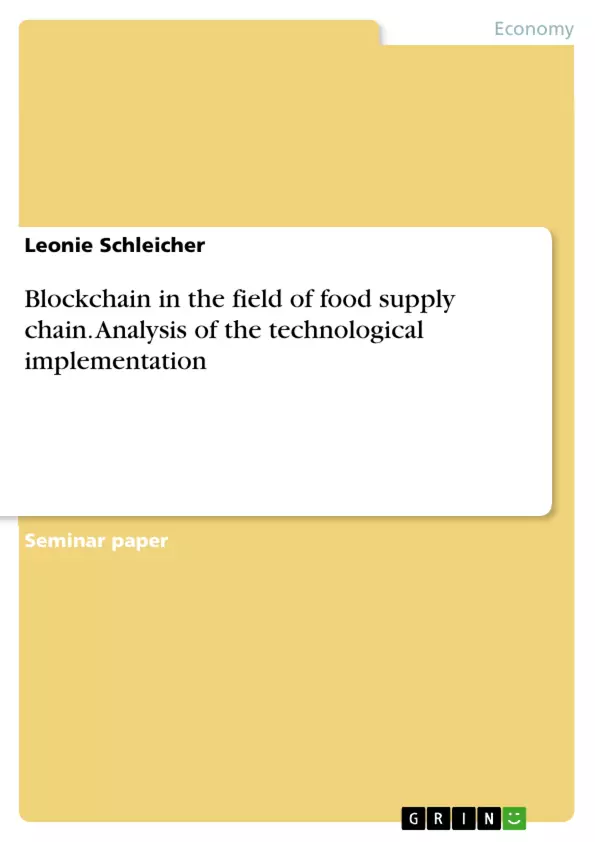This paper deals with the analysis of the technological implementation of blockchain in the field of food supply chain.
Blockchain has long been more than just the technology behind the cryptocurrency Bitcoin. Rather, the technology is now considered the real innovation, which experts believe has the potential to change business models, governments, and even societies. Above all, it is increasingly coming to the public's attention because of its many possible applications. Basically, the blockchain is a public register that enables users to collaborate in a trustworthy and transparent manner. The blockchain system connects all participants in a peer-to-peer network, so no intermediaries are required. In addition to the financial sector, supply chain management is also mentioned in various publications as an important application area for the technology. The food supply chain in particular is increasingly coming into focus due to the increasing complexity and internationalisation of supply chains, as well as the demand for transparency on the part of customers against the backdrop of sustainability. The goals of blockchain technology in the food supply chain include optimising the international exchange of goods and its documentation, minimising the need for middlemen, traceability, and real-time localisation of products. Retail giants, such as Walmart and Carrefour, recognised the potential of the technology early on and rely on IBM Food Trust to map their own product portfolio as transparently as possible.
Inhaltsverzeichnis (Table of Contents)
- Introduction
- Relevance of the Topic
- Aim of the Thesis
- Blockchain Technology
- Peer-to-Peer System
- Architecture
- Cryptographic Function
- Public Key Cryptography
- Cryptographic Hash Function
- Participants of the Blockchain
- How the Blockchain Works in General
- Mining
- Blockchain in the Field of Food Supply Chain
- Basics of Food Supply Chain
- Implementation of Blockchain in Food Supply Chain
- Optimisation of the international Exchange of Goods and its Documentation
- Minimising the Need for Intermediaries
- Traceability of Data, Products and Raw
- Real-Time Localisation within the Supply Chain
- Example: IBM Food Trust
- Advantages
- Disadvantages
- Conclusion
- References
- Glossary
Zielsetzung und Themenschwerpunkte (Objectives and Key Themes)
This thesis aims to analyze the technological implementation of blockchain in the field of food supply chain management. It explores how blockchain can enhance the efficiency, transparency, and security of food supply chains.
- Blockchain Technology and its Fundamentals
- Application of Blockchain in Food Supply Chain Management
- Benefits and Challenges of Blockchain Implementation
- Case Study: IBM Food Trust
- Potential Impact of Blockchain on the Food Industry
Zusammenfassung der Kapitel (Chapter Summaries)
The first chapter provides a comprehensive introduction to blockchain technology, highlighting its evolution from a data storage mechanism to the underlying technology behind Bitcoin. It discusses the concept of peer-to-peer systems, blockchain architecture, cryptographic functions, and the role of various stakeholders in the blockchain ecosystem. The chapter also explains how transactions are processed and validated through mining.
Chapter three delves into the application of blockchain in the food supply chain, exploring the potential benefits and challenges. It discusses key areas where blockchain can be implemented, including streamlining international trade, minimizing the need for intermediaries, ensuring product traceability, and enabling real-time product localization. The chapter also presents a case study on IBM Food Trust, showcasing a practical example of blockchain implementation in the food industry.
Schlüsselwörter (Keywords)
This paper primarily focuses on blockchain technology, its application in the food supply chain, and the role of transparency and traceability. Key terms include blockchain, peer-to-peer, IBM Food Trust, food supply chain, and transparency.
Frequently Asked Questions
How is blockchain used in the food supply chain?
Blockchain is used to create a transparent and immutable record of food products as they move from farm to fork. It improves traceability, safety, and documentation of international goods exchange.
What is IBM Food Trust?
IBM Food Trust is a blockchain-based cloud network that allows retailers like Walmart and Carrefour to map their product portfolios transparently, ensuring better food safety and sustainability tracking.
What are the benefits of traceability in food supply?
Traceability allows for real-time localization of products. In case of contamination, specific batches can be identified and recalled instantly, reducing health risks and financial losses.
Does blockchain eliminate the need for intermediaries?
Yes, by using a peer-to-peer network, participants can collaborate directly in a trustworthy manner, minimizing the need for traditional middlemen and reducing transaction costs.
What role does cryptography play in blockchain?
Cryptography, including public-key encryption and hash functions, ensures that data within the blockchain is secure, verified, and cannot be tampered with by unauthorized parties.
- Quote paper
- Leonie Schleicher (Author), 2022, Blockchain in the field of food supply chain. Analysis of the technological implementation, Munich, GRIN Verlag, https://www.grin.com/document/1191664



